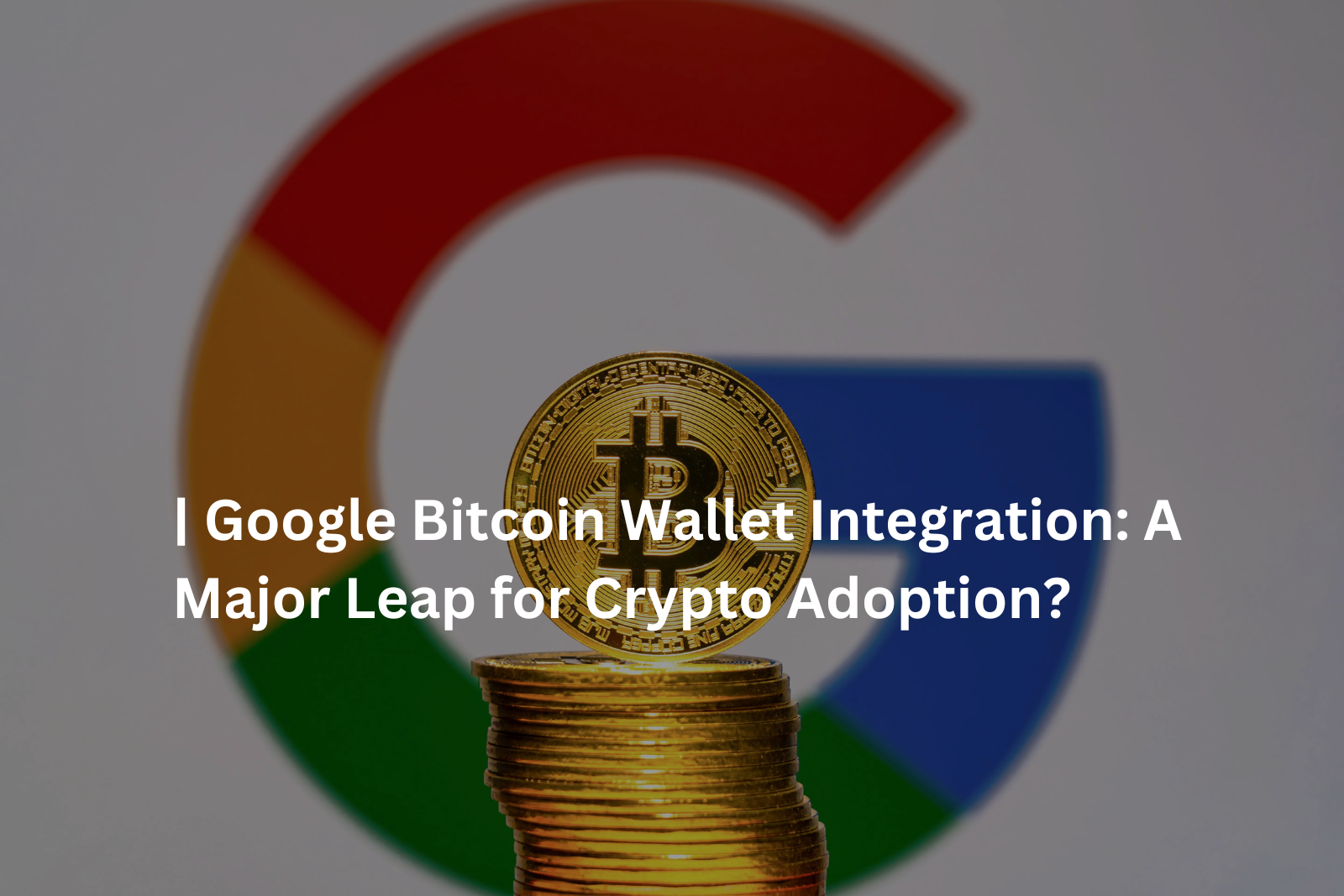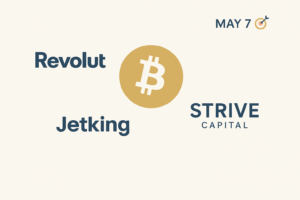
Google, one of the world’s biggest tech giants, is reportedly exploring new ways to onboard users to Bitcoin. This includes integrating Bitcoin wallets into its ecosystem, potentially allowing users to access and manage their Bitcoin holdings directly through their Google accounts. Such a move could revolutionize how users interact with cryptocurrencies, making Bitcoin more accessible to the masses.
In this article, we will explore Google’s Bitcoin wallet initiative, its potential impact on the crypto industry, and what it means for both users and institutional adoption of Bitcoin.
What is Google Planning?
Recent reports suggest that Google is developing solutions that would enable users to log into their Bitcoin wallets using their Google accounts. The goal is to simplify Bitcoin transactions, making them as seamless as traditional Web2 payment systems.
Kyle Song, a Web3 specialist at Google, hinted at these plans, emphasizing that the company is looking at ways to integrate Bitcoin wallets into the Google ecosystem. If successful, this initiative would allow users to:
- Access their Bitcoin wallets via their Google credentials.
- Trade Bitcoin with an interface similar to Google Pay or other familiar payment methods.
- Reduce the complexity of crypto transactions, thereby encouraging wider adoption.
Why is This a Big Deal?
Google’s involvement in Bitcoin wallet integration is significant for several reasons:
1. Mainstream Adoption
With billions of active users worldwide, integrating Bitcoin wallets into Google’s ecosystem could introduce a massive wave of new users to the crypto space.
2. Ease of Use
Managing crypto wallets can be complicated, especially for newcomers. Google’s user-friendly infrastructure could simplify this process, making Bitcoin more accessible to the average person.
3. Security & Trust
Many users hesitate to engage with crypto due to security concerns. Google’s integration could provide an additional layer of credibility and protection against scams and fraud.
4. Institutional Validation
Google’s move would further validate Bitcoin as a major financial asset, encouraging more corporations to explore crypto adoption.
Potential Challenges and Concerns
While this initiative is promising, it comes with its own set of challenges:
1. Regulatory Hurdles
Governments worldwide are still working on how to regulate Bitcoin and crypto transactions. Google’s integration may face compliance challenges depending on different jurisdictions.
2. Privacy Issues
Google is already under scrutiny for data privacy concerns. Integrating Bitcoin wallets could raise additional questions about user control over their financial data.
3. Decentralization vs. Centralization
Bitcoin is known for its decentralized nature. Some crypto enthusiasts may view Google’s involvement as a step toward centralizing Bitcoin, which contradicts the core philosophy of blockchain technology.
What This Means for Bitcoin’s Future
If Google successfully integrates Bitcoin wallets, it could set a precedent for other tech giants like Apple, Microsoft, and Amazon to follow suit. This could lead to:
- Increased institutional investment in Bitcoin.
- Higher transaction volumes due to easier access.
- A surge in Bitcoin adoption among retail users.
On the other hand, this integration could reshape Bitcoin’s role in finance, potentially bridging the gap between traditional banking and decentralized finance (DeFi).
Conclusion
Google’s exploration of Bitcoin wallet integration is a monumental development for the crypto industry. While details are still emerging, this initiative has the potential to make Bitcoin more accessible, secure, and widely adopted. However, challenges like regulatory compliance, security, and privacy concerns must be carefully addressed.
As this story unfolds, it will be interesting to see how Google navigates these challenges and whether other major tech firms follow its lead.
What do you think about Google’s move into Bitcoin? Will it accelerate crypto adoption, or do you have concerns about centralization? Let us know your thoughts!








Hi!
scoopist.in, Thanks for the time and heart you put into posting and moderating.
I recently published my ebooks and training videos on
https://www.hotelreceptionisttraining.com/
They feel like a hidden gem for anyone interested in hospitality management and tourism. These ebooks and videos have already been welcomed and found very useful by students in Russia, the USA, France, the UK, Australia, Spain, and Vietnam—helping learners and professionals strengthen their real hotel reception skills. I believe visitors and readers here might also find them practical and inspiring.
Unlike many resources that stay only on theory, this ebook and training video set is closely connected to today’s hotel business. It comes with full step-by-step training videos that guide learners through real front desk guest service situations—showing exactly how to welcome, assist, and serve hotel guests in a professional way. That’s what makes these materials special: they combine academic knowledge with real practice.
With respect to the owners of scoopist.in who keep this platform alive, I kindly ask to share this small contribution. For readers and visitors, these skills and interview tips can truly help anyone interested in becoming a hotel receptionist prepare with confidence and secure a good job at hotels and resorts worldwide. If found suitable, I’d be grateful for it to remain here so it can reach those who need it.
Why These Ebooks and Training Videos Are Special
They uniquely combine academic pathways such as a bachelor of hospitality management or a master’s degree in hospitality management with very practical guidance on the duties of a front desk agent. They also cover the hotel front desk receptionist job description, and detailed hotel front desk tasks.
The materials go further by explaining the reservation systems in hotels, hotel check-in, check-out flow, guest relations, and practical guest service recovery—covering nearly every situation that arises in the daily business of hotel reception.
Beyond theory, my ebooks and training videos connect the academic side of resort management with the real-life practice of hotel front desk duties and responsibilities.
– For students and readers: they bridge classroom study with career preparation, showing how hotel management certificate programs link directly to front desk skills.
– For professionals and community visitors: they support career growth through interview tips for receptionist, with step-by-step questions to ask a receptionist in an interview. There’s also guidance on writing a strong receptionist job description for resume.
As someone who has taught resort management for nearly 30 years, I rarely see materials that balance the academic foundation with the day-to-day hotel front desk job responsibilities so effectively. This training not only teaches but also simulates real hotel reception challenges—making it as close to on-the-job learning as possible, while still providing structured guidance.
I hope the owners of scoopist.in, and the readers/visitors of scoopist.in, will support my ebooks and training videos so more people can access the information and gain the essential skills needed to become a professional hotel receptionist in any hotel or resort worldwide.
Appreciate you and your community.
Hi there.
scoopist.in, It’s clear you put real effort into your site—thank you.
I recently published my ebooks and training videos on
https://www.hotelreceptionisttraining.com/
They feel like a hidden gem for anyone interested in hotel and management. These ebooks and videos have already been welcomed and found very useful by students in Russia, the USA, France, the UK, Australia, Spain, and Vietnam—helping learners and professionals strengthen their real hotel reception skills. I believe visitors and readers here might also find them practical and inspiring.
Unlike many resources that stay only on theory, this ebook and training video set is closely connected to today’s hotel business. It comes with full step-by-step training videos that guide learners through real front desk guest service situations—showing exactly how to welcome, assist, and serve hotel guests in a professional way. That’s what makes these materials special: they combine academic knowledge with real practice.
With respect to the owners of scoopist.in who keep this platform alive, I kindly ask to share this small contribution. For readers and visitors, these skills and interview tips can truly help anyone interested in becoming a hotel receptionist prepare with confidence and secure a good job at hotels and resorts worldwide. If found suitable, I’d be grateful for it to remain here so it can reach those who need it.
Why These Ebooks and Training Videos Are Special
They uniquely combine academic pathways such as a bachelor’s degree in hospitality management or a master’s degree in hospitality management with very practical guidance on the duties of a front desk agent. They also cover the hotel front desk job description, and detailed hotel front desk duties and responsibilities.
The materials go further by explaining the hotel reservation process, hotel check-in, check-out flow, guest service handling, and practical guest service recovery—covering nearly every situation that arises in the daily business of hotel reception.
Beyond theory, my ebooks and training videos connect the academic side of hospitality management studies with the real-life practice of hotel front desk duties and responsibilities.
– For students and readers: they bridge classroom study with career preparation, showing how hotel management certificate programs link directly to front desk skills.
– For professionals and community visitors: they support career growth through questions for reception interview, with step-by-step questions to ask a receptionist in an interview. There’s also guidance on writing a strong receptionist job description for resume.
As someone who has taught hotel and management courses for nearly 30 years, I rarely see materials that balance the academic foundation with the day-to-day job description of front desk receptionist in hotel so effectively. This training not only teaches but also simulates real hotel reception challenges—making it as close to on-the-job learning as possible, while still providing structured guidance.
I hope the owners of scoopist.in, and the readers/visitors of scoopist.in, will support my ebooks and training videos so more people can access the information and gain the essential skills needed to become a professional hotel receptionist in any hotel or resort worldwide.
Appreciate you and your community.
Hey there.
scoopist.in, Your consistency and kindness in this space don’t go unnoticed.
I recently published my ebooks and training videos on
https://www.hotelreceptionisttraining.com/
They feel like a rare find for anyone interested in hospitality management and tourism. These ebooks and videos have already been welcomed and found very useful by students in Russia, the USA, France, the UK, Australia, Spain, and Vietnam—helping learners and professionals strengthen their real hotel reception skills. I believe visitors and readers here might also find them practical and inspiring.
Unlike many resources that stay only on theory, this ebook and training video set is closely connected to today’s hotel business. It comes with full step-by-step training videos that guide learners through real front desk guest service situations—showing exactly how to welcome, assist, and serve hotel guests in a professional way. That’s what makes these materials special: they combine academic knowledge with real practice.
With respect to the owners of scoopist.in who keep this platform alive, I kindly ask to share this small contribution. For readers and visitors, these skills and interview tips can truly help anyone interested in becoming a hotel receptionist prepare with confidence and secure a good job at hotels and resorts worldwide. If found suitable, I’d be grateful for it to remain here so it can reach those who need it.
Why These Ebooks and Training Videos Are Special
They uniquely combine academic pathways such as a bachelor of hospitality management or a advanced hotel management course with very practical guidance on the duties of a front desk agent. They also cover the hotel front desk receptionist job description, and detailed hotel front desk tasks.
The materials go further by explaining the reservation systems in hotels, hotel check-in, check-out flow, guest service handling, and practical guest service recovery—covering nearly every situation that arises in the daily business of hotel reception.
Beyond theory, my ebooks and training videos connect the academic side of resort management with the real-life practice of hotel front desk duties.
– For students and readers: they bridge classroom study with career preparation, showing how hotel and management course theory link directly to front desk skills.
– For professionals and community visitors: they support career growth through questions for receptionist, with step-by-step questions to ask a receptionist in an interview. There’s also guidance on writing a strong receptionist description for resume.
As someone who has taught hotel and management courses for nearly 30 years, I rarely see materials that balance the academic foundation with the day-to-day hotel front desk job responsibilities so effectively. This training not only teaches but also simulates real hotel reception challenges—making it as close to on-the-job learning as possible, while still providing structured guidance.
I hope the owners of scoopist.in, and the readers/visitors of scoopist.in, will support my ebooks and training videos so more people can access the information and gain the essential skills needed to become a professional hotel receptionist in any hotel or resort worldwide.
Wishing you continued success with your site—truly.
This was a great read—thanks for sharing!
Just thought I’d share something that could benefit hotel owners and travel brands. We recently launched a super easy-to-use automated guest service chatbot designed especially for hotel websites looking to boost bookings, guest satisfaction, and 24/7 support—on autopilot.
It’s a lightweight chatbot widget that installs in minutes—perfect for hotel teams and marketers alike. This hospitality chatbot runs all day and night to capture booking leads, even connecting with Messenger.
See full details and live demo here:
https://chatbotforleads.blogspot.com/2025/04/boost-bookings-and-guest-satisfaction.html
But here’s the best part: besides hotel and tourism, we also offer a full range of chatbot solutions that work beautifully on any website, in any industry, to generate leads in a simple, smart, and wonderful way—only $69 lifetime. No subscriptions. No tech headaches.
Use it as a popup chatbot—and test it out instantly on our blog.
With nearly 30 years of experience in tourism training, we built this tool to be one of the most affordable options available for small businesses.
So if you’re ready to automate your site, or just want a chatbot that works—we’d love for you to check it out.
Let us know how it works for your business!
Hi scoopist.in,
You’re providing high-quality content for your readers.
We assist website owners and bloggers to get real, targeted traffic and convert visitors into potential clients. Using the same method that reached you — posting focused blog comments and contact form messages in your niche and location — our chatbot engages these visitors automatically to capture leads efficiently.
As a special offer, if you purchase our chatbot service (normally $69, now $49), simply tell us your website, and we will take care of the comment and contact form service for you. We’ll create 1000 custom comments and messages to bring visitors interested in your niche and location — worldwide.
We provide chatbots for many niches: general chatbots, real estate, dental, education, hotels & tourism, bars, cafés, automotive, and more.
See the full system here: https://chatbotforleads.blogspot.com/ — it shows clearly how the traffic and lead generation works in action.
Thanks for reading, and Wishing you more engagement and growth with your content.
Hi scoopist.in,
You’re providing high-quality content for your readers.
We support website owners and bloggers to get genuine, niche-specific traffic and convert visitors into potential clients. Using the same method that reached you — posting targeted blog comments and contact form messages in your niche and location — our chatbot engages these visitors automatically to capture leads efficiently.
As a special offer, if you purchase our chatbot service (normally $69, now $49), simply tell us your website, and we will handle the comment and contact form service for you. We’ll create 1000 niche-specific entries to bring visitors interested in your niche and location — by country or even by city.
We provide chatbots for many niches: general chatbots, real estate, dental, education, hotels & tourism, bars, cafés, automotive, and more.
See the full system here: https://chatbotforleads.blogspot.com/ — it shows precisely how the traffic and lead generation works in action.
Thank you for your time, and I hope it helps you reach more potential clients.
Hi scoopist.in,
You’re providing very useful content for your readers.
We assist website owners and bloggers to get real, targeted traffic and convert visitors into potential clients. Using the same method that reached you — posting targeted blog comments and contact form messages in your niche and location — our chatbot engages these visitors automatically to capture leads efficiently.
As a special offer, if you purchase our chatbot service (normally $69, now $49), simply tell us your website, and we will take care of the comment and contact form service for you. We’ll create 1,000 niche-specific entries to bring visitors interested in your niche and location — globally.
We provide chatbots for many niches: all-purpose bots, real estate, dental, education, hotels & tourism, bars, cafés, automotive, and more.
See the full system here: https://chatbotforleads.blogspot.com/ — it shows precisely how the traffic and lead generation works in action.
Many thanks for taking a moment to read this, and Wishing you and your website continued success.
I don’t think the title of your article matches the content lol. Just kidding, mainly because I had some doubts after reading the article.